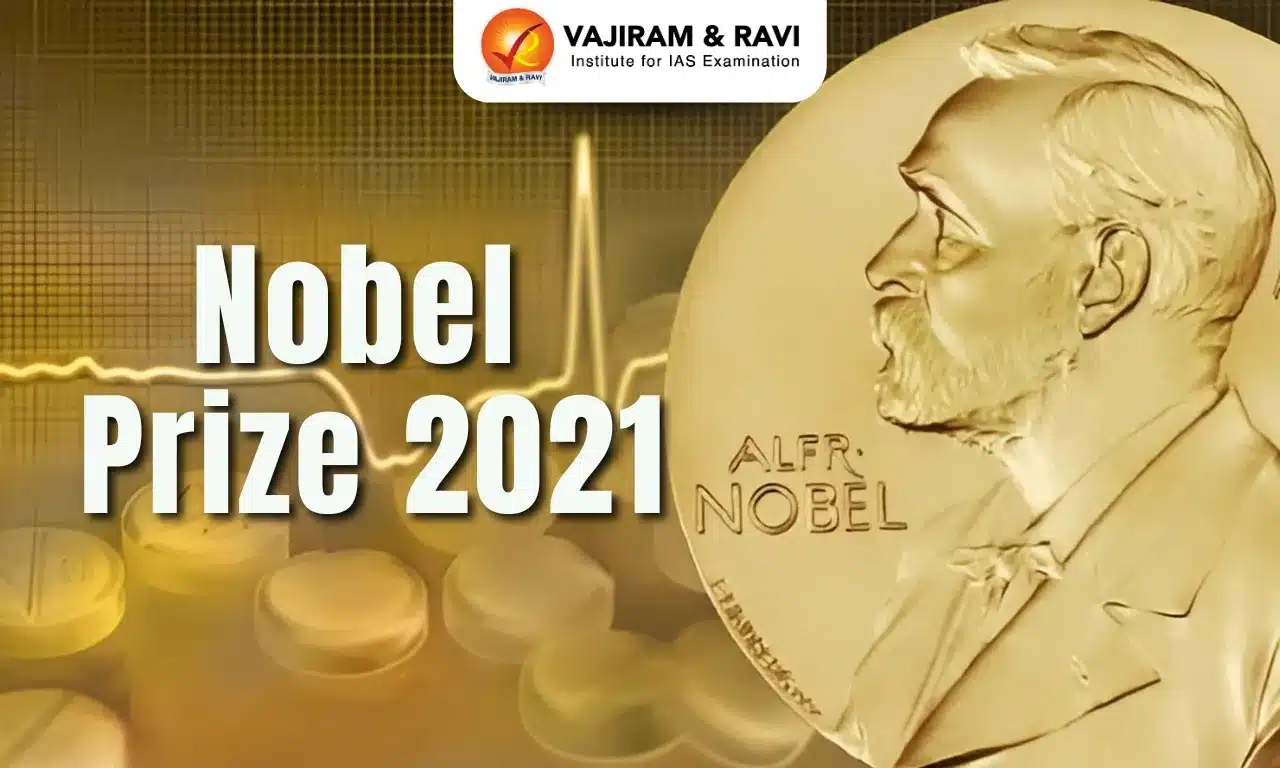The Nobel Prizes 2021 were given to individuals and teams for their contributions in different fields. These prizes were started by a scientist from Sweden named Alfred Nobel, who wanted to celebrate people who made big accomplishments in areas like Literature, Medicine, Physics, Chemistry, Economics, and in Peace. The funds for the awards are provided through a will crafted by Alfred Nobel.
The Swedish Academy gives the prize for literature, the Karolinska Institute for medicine or physiology, and the Royal Swedish Academy of Sciences gives the prizes for physics, chemistry, and economics. The Nobel Peace Prize is given by the Oslo-based Norwegian Nobel Committee.
List of Nobel Prize 2021
In the year 2021, a total of thirteen individuals have been honoured with these six distinguished prizes.
| Field | Winners | Awarded For |
| Physiology/Medicine | David Julius and Ardem Patapoutian | Discoveries of receptors for temperature and touch |
| Physics | Syukuro Manabe, Klaus Hasselmann and Giorgio Parisi | Understanding of complex physical systems |
| Chemistry | Benjamin List and David W.C. MacMillan | Development of asymmetric organocatalysis |
| Literature | Abdulrazak Gurnah | Effects of colonialism and the fate of the refugee in the gulf between cultures and continents |
| Peace | Maria Ressa and Dmitry Andreyevich Muratov | Efforts to safeguard freedom of expression |
| Economics | – David Card
– Joshua D. Angrist and Guido W. Imbens |
– Empirical contributions to labour economics
– The methodological contributions to the analysis of causal relationships |
Nobel Prize in Physiology or Medicine 2021
David Julius (left) and Ardem Patapoutian (right), share the 2021 prize in Medicine for their work on sensing touch and temperature.
The Nobel Laureates
- David Julius, an American physiologist
- Ardem Patapoutian, an Armenian-American molecular biologist and neuroscientist
Research
The intriguing properties of capsaicin, a compound found in chilli peppers, known for inducing a burning sensation were explored.
- Julius created a vast library of DNA fragments corresponding to genes expressed in sensory neurons responsive to pain, heat, and touch.
- Through rigorous experimentation, it was identified that a single gene is capable of granting capsaicin sensitivity to cells that do not normally respond to it.
- This breakthrough led to the discovery of TRPV1 (Transient receptor potential vanilloid-1), a novel ion channel activated by painful heat.
- TRPV1 proved to be a critical link in understanding how differences in temperature can generate electrical signals in the nervous system, particularly those perceived as painful.

- Later, the receptors responsible for detecting mechanical stimuli, such as touch and pressure were unravelled by Patapoutian and his collaborators.
- They also identified a cell line capable of producing an electric signal when individually probed with a micropipette.
- They recognised 72 candidate genes associated with possible mechanoreceptors, systematically silencing each to pinpoint the responsible gene.
- Their efforts culminated in the discovery of Piezo1, an unknown mechanosensitive ion channel.
- Building on Piezo1, a second gene, Piezo2, was identified, both of which were found to be directly activated by pressure applied to cell membranes.
- Piezo2 emerged as a linchpin in our sense of touch, proprioception (body position awareness), and other vital physiological processes.

Impact
- The groundbreaking discoveries of TRPV1, TRPM8, and Piezo channels have fundamentally altered our understanding of how our nervous system processes temperature, touch, and mechanical force.
- These channels regulate processes like blood pressure, respiration, and urinary bladder control.

Ongoing research, stemming from these Nobel Prize-awarded breakthroughs, aims to elucidate their roles in various physiological processes, offering potential insights for treating conditions such as chronic pain.
Nobel Prize in Physics 2021
The Nobel Prize in Physics 2021 was awarded “for groundbreaking contributions to our understanding of complex physical systems,” with one half jointly to Syukuro Manabe (right) and Klaus Hasselmann (left) “for physical modelling of Earth’s climate, quantifying variability and reliably predicting global warming,” and the other half to Giorgio Parisi (middle), “for the discovery of interplay of disorder and the fluctuations in physical systems from an atomic to planetary scale.”

The Nobel Laureates
- Syukuro Manabe, Princeton University, USA
- Klaus Hasselmann, Max Planck Institute for Meteorology, Germany
- Giorgio Parisi, Sapienza University of Rome, Italy
Research
The research laid the foundation of our knowledge of the Earth’s climate and how humanity influences it.
- Manabe and Hasselmann significantly progressed our understanding of Earth’s climate and its response to increased carbon dioxide levels.
- Manabe’s work in the 1960s laid the groundwork for contemporary climate models, revolutionising climate science.
- Hasselmann’s model integrated weather and climate predictions, resolving the paradox of reliable long-term climate modelling despite weather chaos.
- The investigations into the interaction between radiation balance and air mass transport provided crucial insights into how greenhouse gases influence Earth’s surface temperature.
- These innovative methods identified distinct signals or “fingerprints” in the climate, crucial in affirming the role of human-induced CO2 emissions in global temperature rise.

- Parisi’s groundbreaking work on disordered materialsand random processes vastly advanced our understanding of complex systems.
- Complex systems are composed of many components which may interact with each other characterised by randomness and disorder and are difficult to understand.
- His contributions provided a framework for understanding random systems, revealing their underlying principles and behaviour.

Nobel Prize in Chemistry 2021
The Nobel Prize in Chemistry 2021 was awarded jointly to Benjamin List (left) and David W.C. MacMillan (right) “for the development of asymmetric organocatalysis”. This method uses small, environmentally friendly molecules to help produce new substances like medicines, plastics, perfumes, and food flavours.

The Nobel Laureates
- Benjamin List, a German chemist.
- David W.C. MacMillan, Princeton University, USA.
Organocatalysis
- Catalysis is a process that accelerates chemical reactions without being consumed in the process.
- Traditional catalysts included heavy metals and large enzymes, but the new asymmetric organocatalysis method is better because it’s smaller, cheaper, and greener.
- It helps create specific forms of molecules, particularly useful in making medicines.
- Traditional catalysts included heavy metals and large enzymes, but the new asymmetric organocatalysis method is better because it’s smaller, cheaper, and greener.
- In 2000, List and MacMillan developed a new way to speed up chemical reactions using organic catalysts made of stable carbon structures.
- These catalysts contain active groups made of elements like oxygen, nitrogen, sulphur, or phosphorus. They’re eco-friendly and cost-effective to make.
- This method, called Organocatalysis, introduces a third way to speed up reactions alongside metals and enzymes.
- Organocatalysis is crucial for making medicines and other chemicals in a specific form. It’s become widely used and helps reactions happen efficiently.

- Proline is an organic acid classed as a proteinogenic amino acid (used in the biosynthesis of proteins), although it does not contain the amino group but is rather a secondary amine.
- Proline and its derivatives are often used as asymmetric catalysts in proline organocatalysis reactions.
- For example: CBS reduction and proline-catalysed aldol condensation.
- Proline and its derivatives are often used as asymmetric catalysts in proline organocatalysis reactions.

- Applications:
- Organocatalysis, advanced by List and MacMillan, plays a crucial role in efficiently making pharmaceuticals and various molecules for applications like solar cells.
- Their contributions in organocatalysis significantly benefit humanity by enhancing the production of vital compounds for industries such as pharmaceuticals and renewable energy.
Nobel Prize in Literature 2021
The Nobel Prize in Literature for 2021 is awarded to Abdulrazak Gurnah, a novelist, born in Zanzibar and who works in England, “for his uncompromising and compassionate penetration of the effects of colonialism and the fate of refugees in the gulf between cultures and continents”.

Abdulrazak Gurnah
- He examines the enduring consequences of colonial rule on individuals and communities.
- Gurnah’s narratives provide a unique perspective on the complexities and nuances of post-colonial societies, shedding light on the historical, social, and cultural dimensions that continue to shape lives.
- Gurnah’s work sensitively explores the plight of refugees, highlighting their struggles, resilience, and the challenges they face when trying to find a sense of belonging in foreign lands.
- Books: Memory of Departure, Pilgrims’ Way, Dottie, Paradise.
Nobel Prize in Peace 2021
The Nobel Peace Prize 2021 was awarded jointly to Maria Ressa (left) and Dmitry Andreyevich Muratov (right) “for their efforts to safeguard freedom of expression, which is a precondition for democracy and lasting peace”.

The Nobel Laureates
- Maria Ressa is a Filipino and American journalist. She is the CEO and co-founder of Rappler.
- Dmitry Andreyevich Muratov is a Russian editor-in-chief of the newspaper Novaya Gazeta.
Maria Ressa
She fearlessly exposed the abuse of power and authoritarianism in her native country.
- Investigated a controversial anti-drug campaign led by the Duterte regime.
- Exposed the use of social media for spreading fake news and manipulating public discourse.
Dmitry Muratov
He served as editor-in-chief for a total of 24 years, defending freedom of speech in Russia.
- He provided fact-based journalism, shedding light on critical issues in Russian society.
- He withstood harassment, threats, and violence, maintaining the newspaper’s independent stance.
Nobel Prize in Economics 2021
The Nobel Prize in Economics 2021 was divided, one half awarded to David Card (middle) “for his empirical contributions to labour economics”, and the other half jointly to Joshua D. Angrist (right) and Guido W. Imbens (left) “for their contributions to the analysis of causal relationships”.

The Nobel Laureates
- David Card, University of California, Berkeley, USA
- Joshua D. Angrist, an Israeli-American economist at MIT, USA
- Guido W. Imbens, a Dutch-American economist at Stanford University, USA
Labour Economics
Labour economics is the study of the labour force as an element in the process of production.
- David Card was honoured for his significant contributions to the field of labour economics.
- By harnessing the power of natural experiments, he examined the impact of factors such as minimum wage adjustments, immigration trends, and educational policies on the labour market.
- His groundbreaking findings contradicted earlier studies, demonstrating that increasing the minimum wage does not necessarily lead to a reduction in job opportunities.
- Card’s work disproved the common belief that immigrants lead to lower wages for native-born workers.
- Instead, he revealed that the income of native-born workers can benefit from new immigration, while earlier immigrants may face potential negative effects.
- He highlighted the critical importance of resources in educational institutions, asserting that they play a far more significant role in students’ future labour market success than previously believed.
Analysis of Causal Relationships
The other half of the prize was jointly awarded to Joshua Angrist and Guido Imbens for their significant contributions to the analysis of causal relationships, specifically the intricate links between cause and effect.
- Their expertise was fundamental in making sense of data obtained from natural experiments, a particularly challenging task given that researchers lack control over the experiment itself.
- Unlike controlled clinical trials or randomised control trials, natural experiments present complexities in drawing precise conclusions and establishing causal connections.
- Angrist and Imbens adeptly addressed this methodological obstacle, demonstrating how precise cause-and-effect conclusions can indeed be derived from natural experiments.
Last updated on May, 2025
→ UPSC Notification 2025 was released on 22nd January 2025.
→ UPSC Prelims Question Paper 2025 and Unofficial Prelims Answer Key 2025 are available now.
→ UPSC Calendar 2026 is released on 15th May, 2025.
→ The UPSC Vacancy 2025 were released 1129, out of which 979 were for UPSC CSE and remaining 150 are for UPSC IFoS.
→ UPSC Mains 2025 will be conducted on 22nd August 2025.
→ UPSC Prelims 2026 will be conducted on 24th May, 2026 & UPSC Mains 2026 will be conducted on 21st August 2026.
→ The UPSC Selection Process is of 3 stages-Prelims, Mains and Interview.
→ UPSC Result 2024 is released with latest UPSC Marksheet 2024. Check Now!
→ UPSC Toppers List 2024 is released now. Shakti Dubey is UPSC AIR 1 2024 Topper.
→ Also check Best IAS Coaching in Delhi
Tags: nobel prize 2021 quest


















